Business Law Assignment: Contract Law Analysis and Advice
VerifiedAdded on 2022/10/16
|7
|1778
|80
Homework Assignment
AI Summary
This business law assignment delves into two key scenarios within contract law. The first question examines whether Peter can sue SkinnyMe for misrepresentation in an advertisement, analyzing the concepts of offer vs. invitation to treat, mere puff, and unilateral and mutual mistakes. The analysis concludes that Peter's claim is unlikely to succeed due to the nature of the advertisement as an invitation to treat and his unilateral mistake. The second question advises Clarke on Diana's request for her deposit back after she declines to buy SkinnyMe, exploring the essential elements of a valid contract and the consequences of breach, misrepresentation, and deceit. The analysis focuses on offer and acceptance, the impact of a new law, and Clarke's failure to disclose a pending lawsuit against the company, concluding that Diana is entitled to her deposit due to Clarke's deceitful conduct.
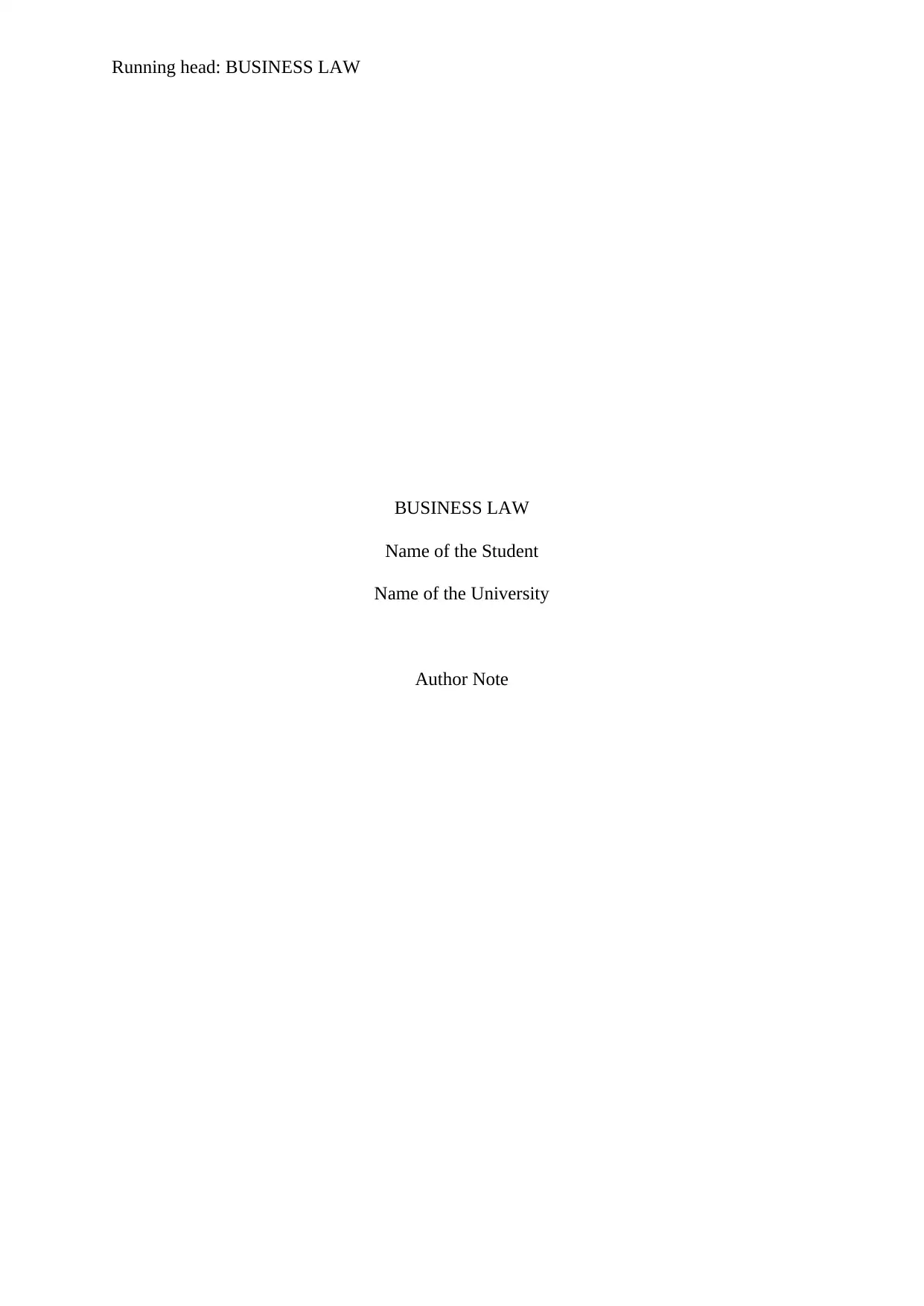
Running head: BUSINESS LAW
BUSINESS LAW
Name of the Student
Name of the University
Author Note
BUSINESS LAW
Name of the Student
Name of the University
Author Note
Paraphrase This Document
Need a fresh take? Get an instant paraphrase of this document with our AI Paraphraser
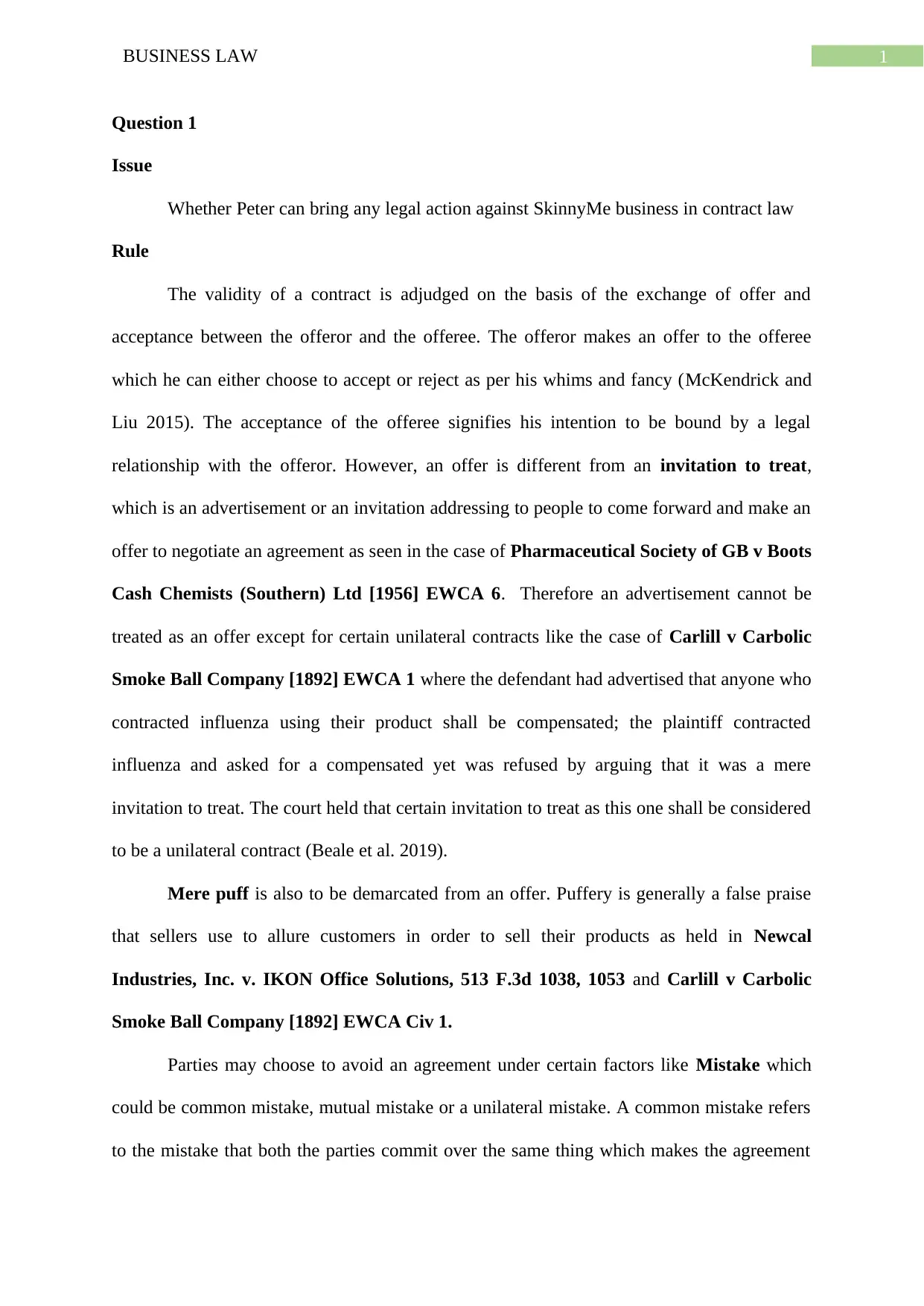
1BUSINESS LAW
Question 1
Issue
Whether Peter can bring any legal action against SkinnyMe business in contract law
Rule
The validity of a contract is adjudged on the basis of the exchange of offer and
acceptance between the offeror and the offeree. The offeror makes an offer to the offeree
which he can either choose to accept or reject as per his whims and fancy (McKendrick and
Liu 2015). The acceptance of the offeree signifies his intention to be bound by a legal
relationship with the offeror. However, an offer is different from an invitation to treat,
which is an advertisement or an invitation addressing to people to come forward and make an
offer to negotiate an agreement as seen in the case of Pharmaceutical Society of GB v Boots
Cash Chemists (Southern) Ltd [1956] EWCA 6. Therefore an advertisement cannot be
treated as an offer except for certain unilateral contracts like the case of Carlill v Carbolic
Smoke Ball Company [1892] EWCA 1 where the defendant had advertised that anyone who
contracted influenza using their product shall be compensated; the plaintiff contracted
influenza and asked for a compensated yet was refused by arguing that it was a mere
invitation to treat. The court held that certain invitation to treat as this one shall be considered
to be a unilateral contract (Beale et al. 2019).
Mere puff is also to be demarcated from an offer. Puffery is generally a false praise
that sellers use to allure customers in order to sell their products as held in Newcal
Industries, Inc. v. IKON Office Solutions, 513 F.3d 1038, 1053 and Carlill v Carbolic
Smoke Ball Company [1892] EWCA Civ 1.
Parties may choose to avoid an agreement under certain factors like Mistake which
could be common mistake, mutual mistake or a unilateral mistake. A common mistake refers
to the mistake that both the parties commit over the same thing which makes the agreement
Question 1
Issue
Whether Peter can bring any legal action against SkinnyMe business in contract law
Rule
The validity of a contract is adjudged on the basis of the exchange of offer and
acceptance between the offeror and the offeree. The offeror makes an offer to the offeree
which he can either choose to accept or reject as per his whims and fancy (McKendrick and
Liu 2015). The acceptance of the offeree signifies his intention to be bound by a legal
relationship with the offeror. However, an offer is different from an invitation to treat,
which is an advertisement or an invitation addressing to people to come forward and make an
offer to negotiate an agreement as seen in the case of Pharmaceutical Society of GB v Boots
Cash Chemists (Southern) Ltd [1956] EWCA 6. Therefore an advertisement cannot be
treated as an offer except for certain unilateral contracts like the case of Carlill v Carbolic
Smoke Ball Company [1892] EWCA 1 where the defendant had advertised that anyone who
contracted influenza using their product shall be compensated; the plaintiff contracted
influenza and asked for a compensated yet was refused by arguing that it was a mere
invitation to treat. The court held that certain invitation to treat as this one shall be considered
to be a unilateral contract (Beale et al. 2019).
Mere puff is also to be demarcated from an offer. Puffery is generally a false praise
that sellers use to allure customers in order to sell their products as held in Newcal
Industries, Inc. v. IKON Office Solutions, 513 F.3d 1038, 1053 and Carlill v Carbolic
Smoke Ball Company [1892] EWCA Civ 1.
Parties may choose to avoid an agreement under certain factors like Mistake which
could be common mistake, mutual mistake or a unilateral mistake. A common mistake refers
to the mistake that both the parties commit over the same thing which makes the agreement
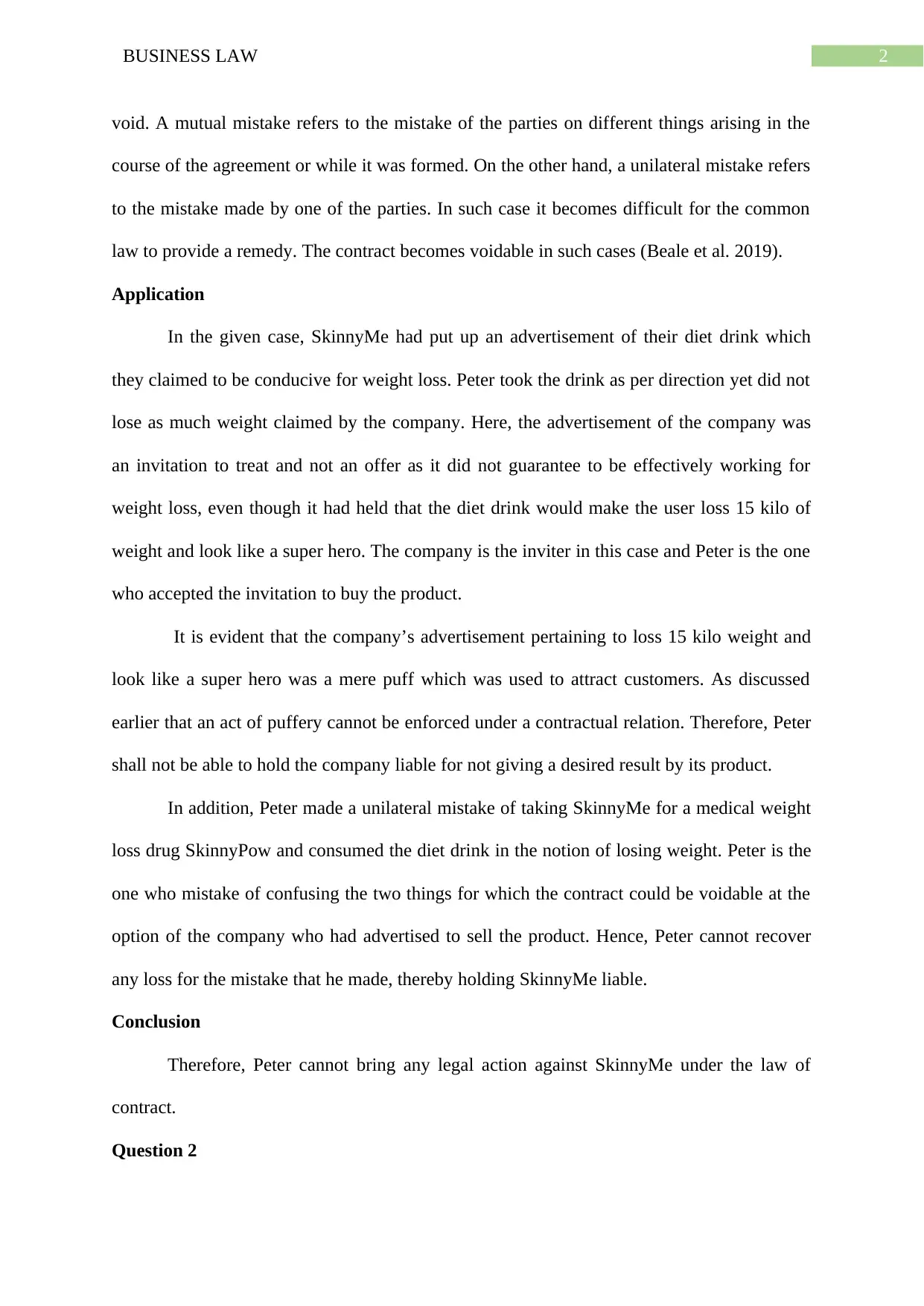
2BUSINESS LAW
void. A mutual mistake refers to the mistake of the parties on different things arising in the
course of the agreement or while it was formed. On the other hand, a unilateral mistake refers
to the mistake made by one of the parties. In such case it becomes difficult for the common
law to provide a remedy. The contract becomes voidable in such cases (Beale et al. 2019).
Application
In the given case, SkinnyMe had put up an advertisement of their diet drink which
they claimed to be conducive for weight loss. Peter took the drink as per direction yet did not
lose as much weight claimed by the company. Here, the advertisement of the company was
an invitation to treat and not an offer as it did not guarantee to be effectively working for
weight loss, even though it had held that the diet drink would make the user loss 15 kilo of
weight and look like a super hero. The company is the inviter in this case and Peter is the one
who accepted the invitation to buy the product.
It is evident that the company’s advertisement pertaining to loss 15 kilo weight and
look like a super hero was a mere puff which was used to attract customers. As discussed
earlier that an act of puffery cannot be enforced under a contractual relation. Therefore, Peter
shall not be able to hold the company liable for not giving a desired result by its product.
In addition, Peter made a unilateral mistake of taking SkinnyMe for a medical weight
loss drug SkinnyPow and consumed the diet drink in the notion of losing weight. Peter is the
one who mistake of confusing the two things for which the contract could be voidable at the
option of the company who had advertised to sell the product. Hence, Peter cannot recover
any loss for the mistake that he made, thereby holding SkinnyMe liable.
Conclusion
Therefore, Peter cannot bring any legal action against SkinnyMe under the law of
contract.
Question 2
void. A mutual mistake refers to the mistake of the parties on different things arising in the
course of the agreement or while it was formed. On the other hand, a unilateral mistake refers
to the mistake made by one of the parties. In such case it becomes difficult for the common
law to provide a remedy. The contract becomes voidable in such cases (Beale et al. 2019).
Application
In the given case, SkinnyMe had put up an advertisement of their diet drink which
they claimed to be conducive for weight loss. Peter took the drink as per direction yet did not
lose as much weight claimed by the company. Here, the advertisement of the company was
an invitation to treat and not an offer as it did not guarantee to be effectively working for
weight loss, even though it had held that the diet drink would make the user loss 15 kilo of
weight and look like a super hero. The company is the inviter in this case and Peter is the one
who accepted the invitation to buy the product.
It is evident that the company’s advertisement pertaining to loss 15 kilo weight and
look like a super hero was a mere puff which was used to attract customers. As discussed
earlier that an act of puffery cannot be enforced under a contractual relation. Therefore, Peter
shall not be able to hold the company liable for not giving a desired result by its product.
In addition, Peter made a unilateral mistake of taking SkinnyMe for a medical weight
loss drug SkinnyPow and consumed the diet drink in the notion of losing weight. Peter is the
one who mistake of confusing the two things for which the contract could be voidable at the
option of the company who had advertised to sell the product. Hence, Peter cannot recover
any loss for the mistake that he made, thereby holding SkinnyMe liable.
Conclusion
Therefore, Peter cannot bring any legal action against SkinnyMe under the law of
contract.
Question 2
⊘ This is a preview!⊘
Do you want full access?
Subscribe today to unlock all pages.

Trusted by 1+ million students worldwide
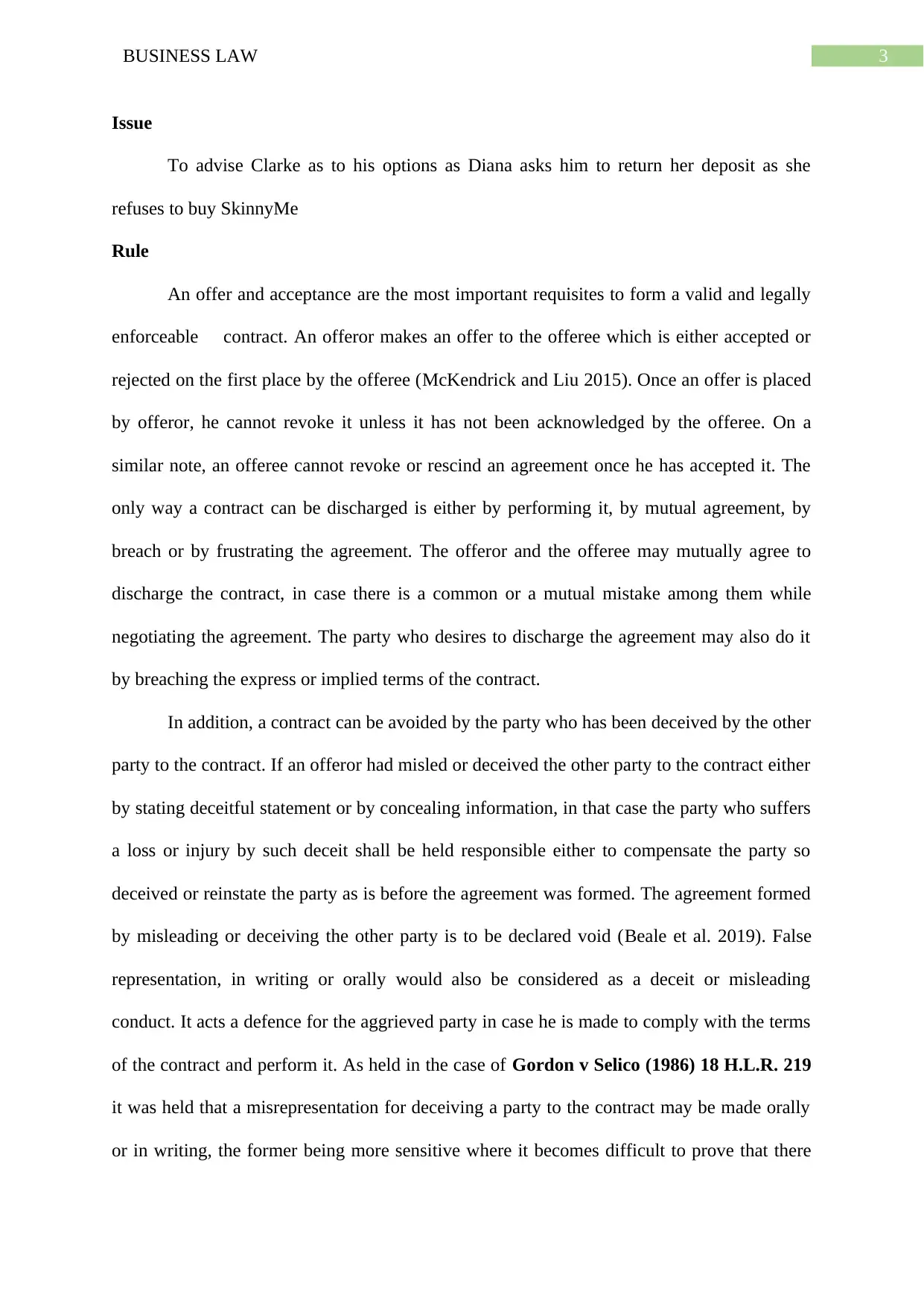
3BUSINESS LAW
Issue
To advise Clarke as to his options as Diana asks him to return her deposit as she
refuses to buy SkinnyMe
Rule
An offer and acceptance are the most important requisites to form a valid and legally
enforceable contract. An offeror makes an offer to the offeree which is either accepted or
rejected on the first place by the offeree (McKendrick and Liu 2015). Once an offer is placed
by offeror, he cannot revoke it unless it has not been acknowledged by the offeree. On a
similar note, an offeree cannot revoke or rescind an agreement once he has accepted it. The
only way a contract can be discharged is either by performing it, by mutual agreement, by
breach or by frustrating the agreement. The offeror and the offeree may mutually agree to
discharge the contract, in case there is a common or a mutual mistake among them while
negotiating the agreement. The party who desires to discharge the agreement may also do it
by breaching the express or implied terms of the contract.
In addition, a contract can be avoided by the party who has been deceived by the other
party to the contract. If an offeror had misled or deceived the other party to the contract either
by stating deceitful statement or by concealing information, in that case the party who suffers
a loss or injury by such deceit shall be held responsible either to compensate the party so
deceived or reinstate the party as is before the agreement was formed. The agreement formed
by misleading or deceiving the other party is to be declared void (Beale et al. 2019). False
representation, in writing or orally would also be considered as a deceit or misleading
conduct. It acts a defence for the aggrieved party in case he is made to comply with the terms
of the contract and perform it. As held in the case of Gordon v Selico (1986) 18 H.L.R. 219
it was held that a misrepresentation for deceiving a party to the contract may be made orally
or in writing, the former being more sensitive where it becomes difficult to prove that there
Issue
To advise Clarke as to his options as Diana asks him to return her deposit as she
refuses to buy SkinnyMe
Rule
An offer and acceptance are the most important requisites to form a valid and legally
enforceable contract. An offeror makes an offer to the offeree which is either accepted or
rejected on the first place by the offeree (McKendrick and Liu 2015). Once an offer is placed
by offeror, he cannot revoke it unless it has not been acknowledged by the offeree. On a
similar note, an offeree cannot revoke or rescind an agreement once he has accepted it. The
only way a contract can be discharged is either by performing it, by mutual agreement, by
breach or by frustrating the agreement. The offeror and the offeree may mutually agree to
discharge the contract, in case there is a common or a mutual mistake among them while
negotiating the agreement. The party who desires to discharge the agreement may also do it
by breaching the express or implied terms of the contract.
In addition, a contract can be avoided by the party who has been deceived by the other
party to the contract. If an offeror had misled or deceived the other party to the contract either
by stating deceitful statement or by concealing information, in that case the party who suffers
a loss or injury by such deceit shall be held responsible either to compensate the party so
deceived or reinstate the party as is before the agreement was formed. The agreement formed
by misleading or deceiving the other party is to be declared void (Beale et al. 2019). False
representation, in writing or orally would also be considered as a deceit or misleading
conduct. It acts a defence for the aggrieved party in case he is made to comply with the terms
of the contract and perform it. As held in the case of Gordon v Selico (1986) 18 H.L.R. 219
it was held that a misrepresentation for deceiving a party to the contract may be made orally
or in writing, the former being more sensitive where it becomes difficult to prove that there
Paraphrase This Document
Need a fresh take? Get an instant paraphrase of this document with our AI Paraphraser
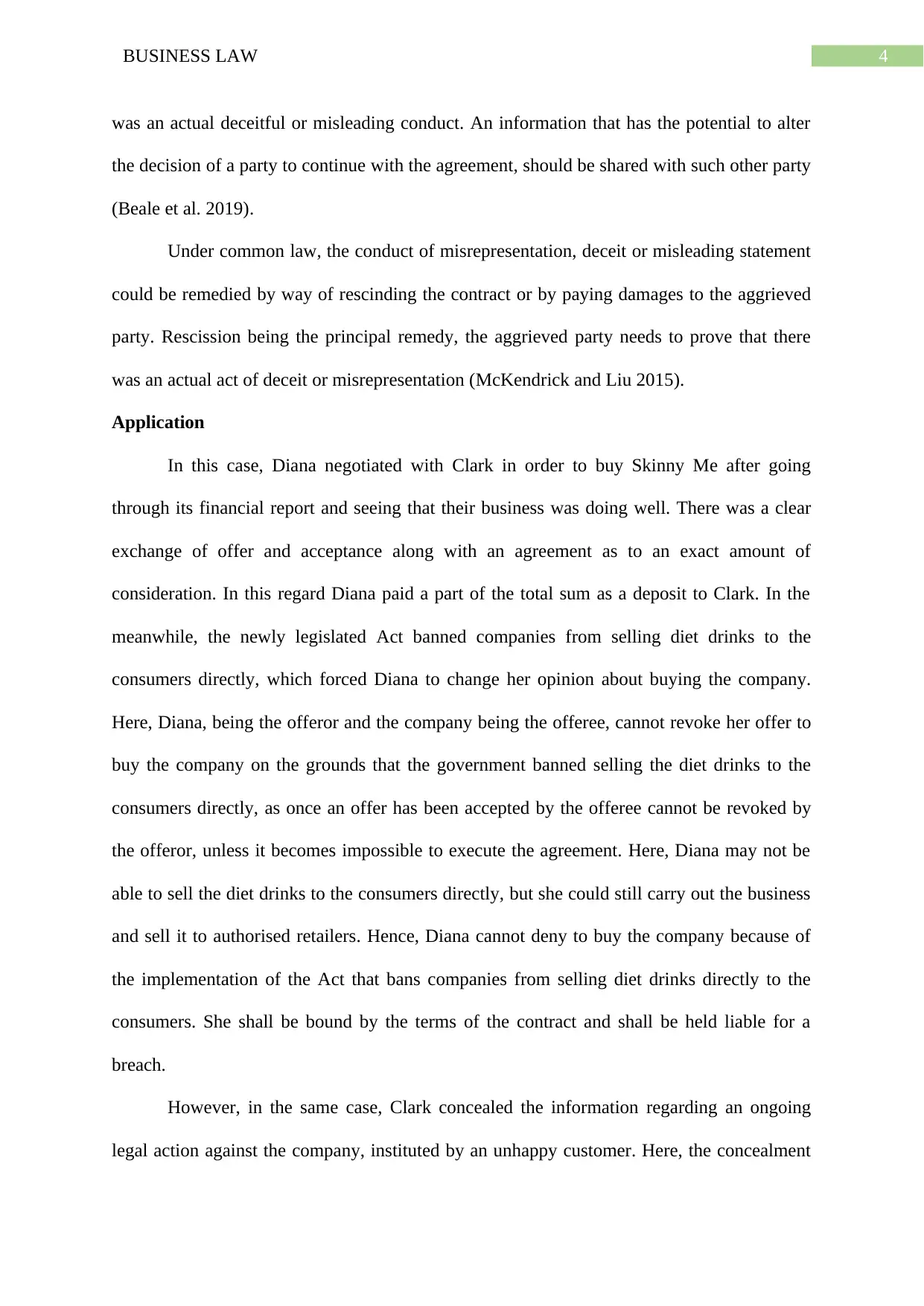
4BUSINESS LAW
was an actual deceitful or misleading conduct. An information that has the potential to alter
the decision of a party to continue with the agreement, should be shared with such other party
(Beale et al. 2019).
Under common law, the conduct of misrepresentation, deceit or misleading statement
could be remedied by way of rescinding the contract or by paying damages to the aggrieved
party. Rescission being the principal remedy, the aggrieved party needs to prove that there
was an actual act of deceit or misrepresentation (McKendrick and Liu 2015).
Application
In this case, Diana negotiated with Clark in order to buy Skinny Me after going
through its financial report and seeing that their business was doing well. There was a clear
exchange of offer and acceptance along with an agreement as to an exact amount of
consideration. In this regard Diana paid a part of the total sum as a deposit to Clark. In the
meanwhile, the newly legislated Act banned companies from selling diet drinks to the
consumers directly, which forced Diana to change her opinion about buying the company.
Here, Diana, being the offeror and the company being the offeree, cannot revoke her offer to
buy the company on the grounds that the government banned selling the diet drinks to the
consumers directly, as once an offer has been accepted by the offeree cannot be revoked by
the offeror, unless it becomes impossible to execute the agreement. Here, Diana may not be
able to sell the diet drinks to the consumers directly, but she could still carry out the business
and sell it to authorised retailers. Hence, Diana cannot deny to buy the company because of
the implementation of the Act that bans companies from selling diet drinks directly to the
consumers. She shall be bound by the terms of the contract and shall be held liable for a
breach.
However, in the same case, Clark concealed the information regarding an ongoing
legal action against the company, instituted by an unhappy customer. Here, the concealment
was an actual deceitful or misleading conduct. An information that has the potential to alter
the decision of a party to continue with the agreement, should be shared with such other party
(Beale et al. 2019).
Under common law, the conduct of misrepresentation, deceit or misleading statement
could be remedied by way of rescinding the contract or by paying damages to the aggrieved
party. Rescission being the principal remedy, the aggrieved party needs to prove that there
was an actual act of deceit or misrepresentation (McKendrick and Liu 2015).
Application
In this case, Diana negotiated with Clark in order to buy Skinny Me after going
through its financial report and seeing that their business was doing well. There was a clear
exchange of offer and acceptance along with an agreement as to an exact amount of
consideration. In this regard Diana paid a part of the total sum as a deposit to Clark. In the
meanwhile, the newly legislated Act banned companies from selling diet drinks to the
consumers directly, which forced Diana to change her opinion about buying the company.
Here, Diana, being the offeror and the company being the offeree, cannot revoke her offer to
buy the company on the grounds that the government banned selling the diet drinks to the
consumers directly, as once an offer has been accepted by the offeree cannot be revoked by
the offeror, unless it becomes impossible to execute the agreement. Here, Diana may not be
able to sell the diet drinks to the consumers directly, but she could still carry out the business
and sell it to authorised retailers. Hence, Diana cannot deny to buy the company because of
the implementation of the Act that bans companies from selling diet drinks directly to the
consumers. She shall be bound by the terms of the contract and shall be held liable for a
breach.
However, in the same case, Clark concealed the information regarding an ongoing
legal action against the company, instituted by an unhappy customer. Here, the concealment
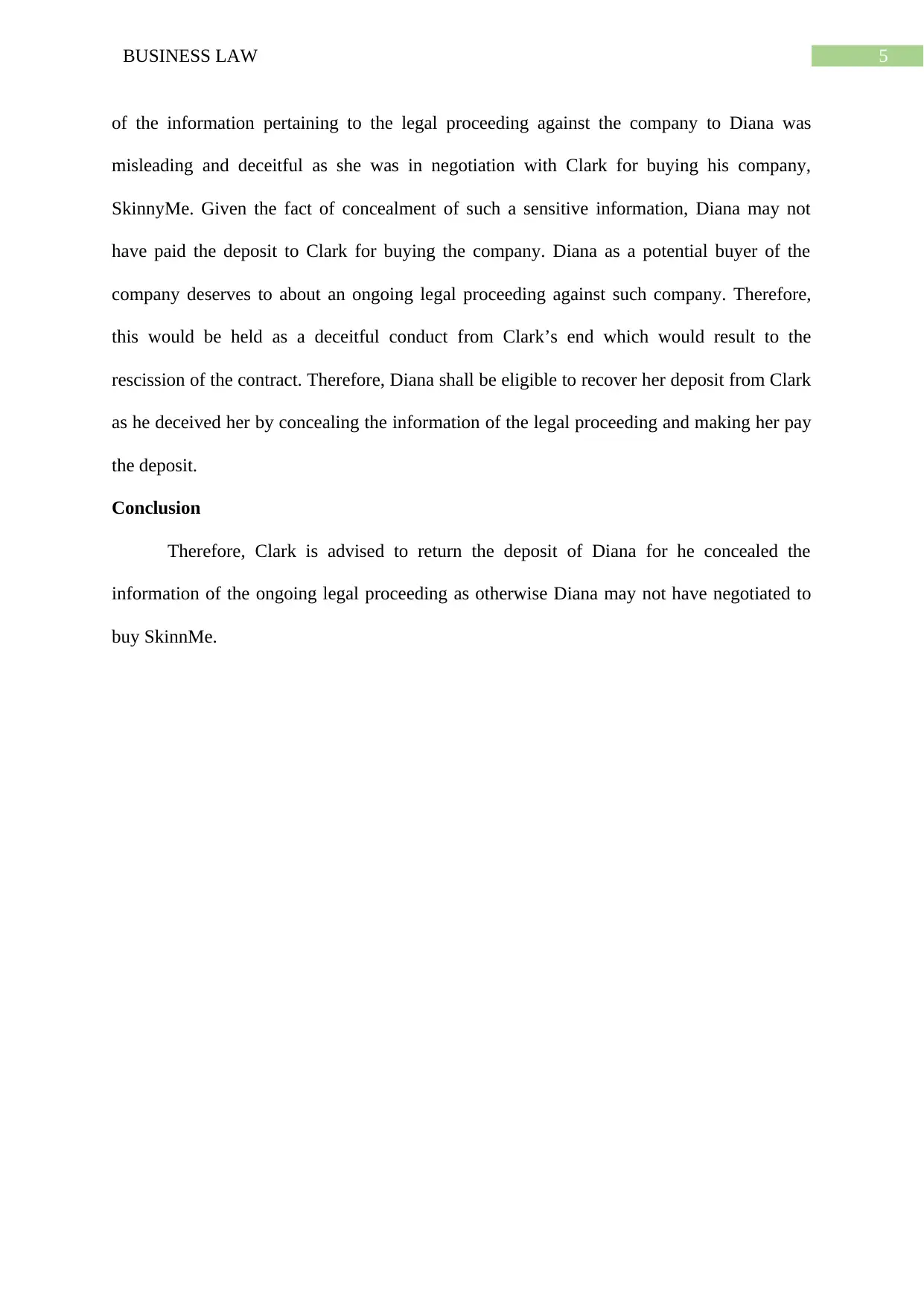
5BUSINESS LAW
of the information pertaining to the legal proceeding against the company to Diana was
misleading and deceitful as she was in negotiation with Clark for buying his company,
SkinnyMe. Given the fact of concealment of such a sensitive information, Diana may not
have paid the deposit to Clark for buying the company. Diana as a potential buyer of the
company deserves to about an ongoing legal proceeding against such company. Therefore,
this would be held as a deceitful conduct from Clark’s end which would result to the
rescission of the contract. Therefore, Diana shall be eligible to recover her deposit from Clark
as he deceived her by concealing the information of the legal proceeding and making her pay
the deposit.
Conclusion
Therefore, Clark is advised to return the deposit of Diana for he concealed the
information of the ongoing legal proceeding as otherwise Diana may not have negotiated to
buy SkinnMe.
of the information pertaining to the legal proceeding against the company to Diana was
misleading and deceitful as she was in negotiation with Clark for buying his company,
SkinnyMe. Given the fact of concealment of such a sensitive information, Diana may not
have paid the deposit to Clark for buying the company. Diana as a potential buyer of the
company deserves to about an ongoing legal proceeding against such company. Therefore,
this would be held as a deceitful conduct from Clark’s end which would result to the
rescission of the contract. Therefore, Diana shall be eligible to recover her deposit from Clark
as he deceived her by concealing the information of the legal proceeding and making her pay
the deposit.
Conclusion
Therefore, Clark is advised to return the deposit of Diana for he concealed the
information of the ongoing legal proceeding as otherwise Diana may not have negotiated to
buy SkinnMe.
⊘ This is a preview!⊘
Do you want full access?
Subscribe today to unlock all pages.

Trusted by 1+ million students worldwide
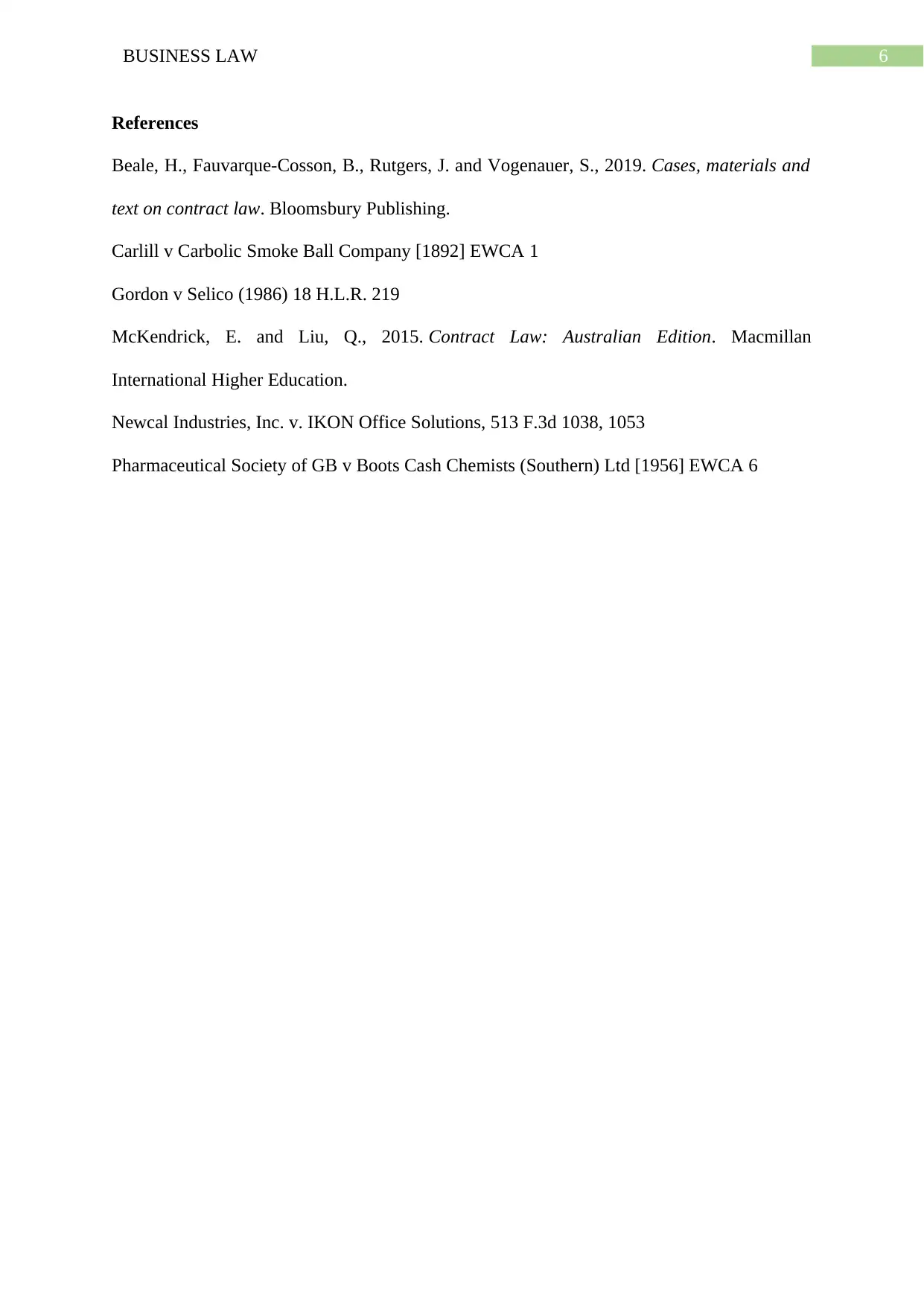
6BUSINESS LAW
References
Beale, H., Fauvarque-Cosson, B., Rutgers, J. and Vogenauer, S., 2019. Cases, materials and
text on contract law. Bloomsbury Publishing.
Carlill v Carbolic Smoke Ball Company [1892] EWCA 1
Gordon v Selico (1986) 18 H.L.R. 219
McKendrick, E. and Liu, Q., 2015. Contract Law: Australian Edition. Macmillan
International Higher Education.
Newcal Industries, Inc. v. IKON Office Solutions, 513 F.3d 1038, 1053
Pharmaceutical Society of GB v Boots Cash Chemists (Southern) Ltd [1956] EWCA 6
References
Beale, H., Fauvarque-Cosson, B., Rutgers, J. and Vogenauer, S., 2019. Cases, materials and
text on contract law. Bloomsbury Publishing.
Carlill v Carbolic Smoke Ball Company [1892] EWCA 1
Gordon v Selico (1986) 18 H.L.R. 219
McKendrick, E. and Liu, Q., 2015. Contract Law: Australian Edition. Macmillan
International Higher Education.
Newcal Industries, Inc. v. IKON Office Solutions, 513 F.3d 1038, 1053
Pharmaceutical Society of GB v Boots Cash Chemists (Southern) Ltd [1956] EWCA 6
1 out of 7
Related Documents
Your All-in-One AI-Powered Toolkit for Academic Success.
+13062052269
info@desklib.com
Available 24*7 on WhatsApp / Email
![[object Object]](/_next/static/media/star-bottom.7253800d.svg)
Unlock your academic potential
Copyright © 2020–2025 A2Z Services. All Rights Reserved. Developed and managed by ZUCOL.





